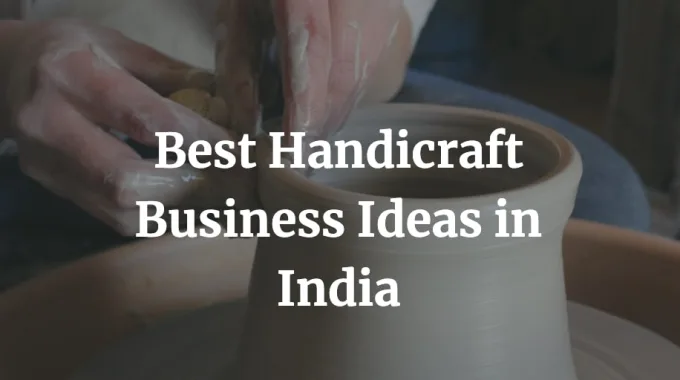Best 25 Highly Profitable Business Ideas in Bangalore

Let me tell you something I’ve learned over the years of mentoring small business owners across India—no city reinvents itself quite like Bangalore. It’s not just the IT capital anymore. It’s a chaotic yet charming mix of old bungalows, tech unicorns, yoga cafes, and traffic jams. Underneath all that noise is a goldmine of small business opportunities waiting for someone with curiosity, courage, and common sense.
The city’s vibe is young, aspirational, and hungry for convenience, creativity, and community. That’s why if you’re looking for the best business ideas in Bangalore, you need to think hyperlocal, lifestyle-oriented, and scalable. Not all of them will make you a millionaire overnight, but several can earn you consistent income—and more importantly, build something you’re proud of.
What Makes Bangalore an Ideal City to Start a Small Business?
If you’re wondering whether Bangalore is right for your small business, consider this:
- The average consumer here is younger and more open-minded—they want quality, not just affordability.
- There’s a massive migrant population from all over India, making it a culturally rich, multi-lingual market.
- Every neighbourhood is a micro-market. What sells in Koramangala may not fly in Yelahanka.
- Digital adoption is high. Locals trust UPI, order online, and follow local brands on Instagram.
But the biggest differentiator? Bangaloreans love new ideas. If you’ve got a niche concept with a thoughtful execution, this city gives you room to grow.
Best Small Businesses to Start in Bangalore
Below are business ideas that aren’t just viable on paper but have the right cultural and commercial DNA to work here.
1. Pet Grooming & Pet Cafes in Residential Pockets

Pet ownership in Bangalore is booming. Just walk through Indiranagar or HSR Layout on a Sunday morning and you’ll spot more Labradors than lattes. Yet, the pet grooming industry is still largely unorganised.
Start small with a pet grooming van or a home-based setup. Add on services like spa treatments, pet birthday parties, or even a cosy weekend pet café. Partner with apartment societies to offer on-site pet days. The emotional bond people have with their pets creates recurring revenue opportunities.
- Estimated Startup Cost: ₹1–3 lakhs for a mobile grooming setup or ₹5–8 lakhs for a basic pet café
- Expected Monthly Profit Margin: 35% to 50%
- Market Potential: The Indian pet grooming market reached USD 414 million in 2024 and is projected to grow to USD 754 million by 2033 (CAGR ~6.4%)
2. Healthy South Indian Tiffin Services for Working Professionals
Everyone wants to eat healthy, but no one wants to cook after a 2-hour traffic slog. The idea here is simple: deliver nutritious, home-style South Indian meals—idlis made with millets, low-oil rasam, protein-rich sambar—to busy professionals.
Differentiate by focusing on health metrics (low GI, high protein), and use WhatsApp for easy ordering. Target tech parks, PGs, and apartments in Whitefield, Electronic City, or Bellandur.
- Estimated Startup Cost: ₹50,000 to ₹1.5 lakhs (home kitchen with basic packaging)
- Expected Monthly Profit Margin: 25% to 40%
- Market Potential: India’s meal subscription market was valued at USD 3.7 billion in 2022 and is expected to cross USD 13.7 billion by 2032, growing at ~14% CAGR.
3. Hyperlocal Errand & Delivery Concierge
Bangalore’s traffic is legendary, and not in a good way. That’s a problem you can build a business around. As per this report, the offline grocery business sector is expected to experience a CAGR of 37.1% from 2021-2028.
Set up a hyperlocal concierge service that handles errands: grocery pickup, dry cleaning, pharmacy runs, even last-minute courier drops. Focus on gated communities or old-age homes. Keep it app-free at first, just WhatsApp and a phone line.
This business grows fast through trust. Be prompt, polite, and predictable, and your referrals will do the marketing.
- Estimated Startup Cost: ₹30,000 to ₹1 lakh (two-wheeler + branding + phone support)
- Expected Monthly Profit Margin: 30% to 45%
- Market Potential: The Indian online food delivery market alone reached USD 45 billion in 2024, growing at ~18% CAGR.
4. Conversational Kannada & English Coaching
Many newcomers struggle to learn Kannada, and plenty of locals want better English for customer-facing roles.
Create micro-courses that teach real-world Kannada and English: how to speak to an auto driver, talk to a client, or negotiate rent. Keep sessions short and conversational. Market through PGs, housekeeping networks, and security agencies.
Add a tech layer later—maybe a mobile app or an Alexa skill.
- Estimated Startup Cost: ₹50,000–₹1 Lakh
- Expected Monthly Profit Margin: 40%–60%
- Market Potential: India’s language-learning market reached USD 1.4 billion in 2024 and is expected to top USD 3.2 billion by 2030.
5. Balcony Makeover & Urban Gardening Services
Most Bangalore homes have balconies. Very few use them well. You can change that.
Offer affordable balcony makeovers with vertical gardens, hanging planters, solar lights, and compact furniture. Upsell seasonal maintenance or workshops on growing your herbs.
Apartment complexes love this idea—it adds value to their listings. Partner with builders and local nurseries.
- Estimated Startup Cost: ₹50,000–₹2 lakhs
- Expected Monthly Profit Margin: 30%–50%
- Market Potential: The global urban gardening market was USD 23 billion in 2024, set to reach USD 40 billion by 2030.
6. Niche Digital Marketing for Artisans & Local Brands

Many Bangalore-based artists, indie food brands, and boutiques make great products but struggle with digital visibility.
If you understand Instagram marketing, basic Shopify setup, or even Canva design, start a boutique digital marketing service for local brands. Instead of monthly retainers, offer campaign-based pricing or training workshops.
Your first few clients might come from flea markets or art exhibitions—attend them and pitch gently.
- Estimated Startup Cost: ₹30,000 – ₹1.2 lakhs (tools, basic ads, website setup)
- Expected Monthly Profit Margin: 30% – 55%
- Market Potential: India’s digital marketing sector was valued at USD 5.15 billion in 2024, projected to grow to USD 72.10 billion by 2034 (CAGR 30.2%)
7. Microbrewery or Craft Beverage Brand
Bangalore’s love for beer is unmatched. But instead of going big, go craft.
Launch a small batch, local-flavour microbrewery—using ragi, coffee, or jackfruit. Or, start a bottled kombucha, cold brew, or herbal soda brand that taps into the health-conscious market.
Use cafes, organic stores, and subscription models for distribution. Bangalore’s F&B crowd is always looking for new beverage stories.
- Estimated Startup Cost: ₹10–25 lakhs (basic brewing equipment, touchpoint)
- Expected Monthly Profit Margin: 25% – 45%
- Market Potential: India’s craft beer market stood at USD 4.7 billion in 2024, expected to reach USD 24.5 billion by 2032 (CAGR 22.9%)
8. Kids Enrichment Studio (STEAM + Kannada Culture)
Parents are looking for weekend activities beyond tuition. A kids’ enrichment studio that blends coding, storytelling, Kannada folk arts, and sustainability can be a big hit.
Keep it workshop-based—robotics one weekend, shadow puppetry the next. Position it as ‘cultural literacy meets future-readiness.’
Locate near premium schools or housing communities with young families.
- Estimated Startup Cost: ₹3–7 lakhs (space rent, material, instructors)
- Expected Monthly Profit Margin: 20% – 40%
- Market Potential: India’s children’s entertainment centers market was worth USD 1.0 billion in 2024, projected to reach USD 1.88 billion by 2030 (CAGR 11.3%)
9. Themed Street Food Cart for IT Zones
Food carts are nothing new. But Bangalore’s office crowd is bored of the same old rolls and chaats.
Create a themed food cart—North East momos one week, Kerala parotta tacos the next. Serve clean, fast, and delicious. Target tech parks or startup-heavy areas like HSR or Manyata.
Use social media to drop weekly menus. Customers love the anticipation.
- Estimated Startup Cost: ₹2–5 lakhs (cart + equipment + licenses)
- Expected Monthly Profit Margin: 30% – 50%
- Market Potential: India’s online food delivery sector revenue neared USD 45 billion in 2024, growing ~18% annually
- Read: Best Street Food Business Ideas
10. Eco-Friendly Home Product Brand
Bangalore is a city that cares—not just about technology, but about what goes into their homes and the planet. From Indiranagar’s zero-waste stores to Koramangala’s sustainable cafes, eco-conscious living isn’t just a trend here—it’s a lifestyle choice.
That’s where your eco-friendly home product brand can thrive. Think biodegradable cleaning agents, bamboo toothbrushes, beeswax wraps, coconut shell bowls, and reusable cloth bags. Package them beautifully, price them fairly, and tell an honest sustainability story.
- Estimated Startup Cost: ₹1–3 lakhs (inventory, branding, packaging, basic e-commerce)
- Expected Monthly Profit Margin: 25%–45%
- Market Potential: The Indian sustainable products market is pegged to reach USD 30 billion by 2030, with household products leading demand.
11. Gourmet Cloud Kitchen for Regional Indian Cuisines
In a city where foodies are always chasing new flavours, a cloud kitchen that serves authentic regional dishes—think Bihari Litti Chokha, Assamese Fish Curry, or Chettinad Kozhi—can be a niche goldmine. Skip the expensive dine-in setup and focus on delivering soul food to the city’s doorstep.
Focus on one cuisine at a time and use aggregators like Swiggy and Zomato to test demand. Target IT hubs and gated communities where food delivery is a daily routine. Bangalore contributes over 12% of India’s cloud kitchen orders, led by millennials and remote professionals.
- Estimated Startup Cost: ₹1.5–4 lakhs (equipment, licenses, branding)
- Expected Monthly Profit Margin: 30%–50%
- Market Potential: India’s cloud kitchen market is expected to hit USD 3.6 billion by 2027, growing at a 17% CAGR.
12. Upcycled Furniture Studio
Don’t just sell furniture—tell a story with every piece. In Bangalore’s hip rental market, where tenants value aesthetics and sustainability, a homegrown studio that upcycles old wood, metal, or vintage pieces into modern decor has both emotional and commercial appeal.
Market your creations on Instagram, Etsy, or at Sunday soul markets. Collaborate with interior designers and architects for B2B deals.
- Estimated Startup Cost: ₹1.5–4 lakhs (tools, raw inventory, workspace)
- Expected Monthly Profit Margin: 25%–45%
- Market Potential: The Indian upcycled home décor market is a rising niche within the USD 60+ billion furniture industry, expected to grow at 10%+ CAGR.
13. Freelance Tech Support for Small Businesses
Not every shop or cafe owner knows how to set up a POS, manage their Wi-Fi, or troubleshoot printer errors. Offer freelance tech support for small retailers, salons, and cafés.
Charge on-call rates or monthly retainers. You don’t need to be a full-stack developer—just reliable.
- Estimated Startup Cost: ₹60,000–₹2.5 lakhs
- Expected Monthly Profit Margin: 30%–50%
- Market Potential: India’s pet care industry is projected to surpass USD 5 billion by 2030, with services like pet events and accessories making up a growing share.
14. Speciality Food Retail (Cheese, Pickles, Teas)
Launch a small retail or online store selling gourmet, locally made products: artisanal cheese from Tamil Nadu, Himalayan teas, or Andhra pickles.
Cater to expats, foodies, and niche cafés. Create tasting events or subscription boxes to build a loyal customer base.
- Estimated Startup Cost: ₹3–8 lakhs
- Expected Monthly Profit Margin: 20%–35%
- Market Potential: India’s co-working market is projected to reach USD 2.3 billion by 2027, driven by freelancers, startups, and hybrid workers
15. Community-Based Co-Working Cafés

There’s a growing market for co-working spaces that feel like a second home. Create a cosy café with fast Wi-Fi, plug points, and monthly work-from-here plans.
Located in BTM, Jayanagar, or Sahakar Nagar, this setup works great for freelancers, consultants, and creators.
- Estimated Startup Cost: ₹2–5 lakhs
- Expected Monthly Profit Margin: 25%–40%
- Market Potential: The Indian handicrafts market reached USD 4.7 billion in 2024, projected to hit USD 9.3 billion by 2030.
16. AI Tools & Automation Workshops for Small Business Owners
Educate other local business owners—salon owners, traders, tutors—on using simple AI tools like Canva, ChatGPT, Google Sheets automation, etc.
Offer weekend classes at co-working spaces or community halls. It’s high-value, low-competition.
- Estimated Startup Cost: ₹1.5–4 lakhs (tools, warehouse space, initial inventory)
- Expected Monthly Profit Margin: 25%–45%
- Market Potential: India’s furniture resale and upcycled decor market is projected to reach USD 2.2 billion by 2027, with sustainability trends fueling demand.
17. Personalised Gift Curation Studio
People in Bangalore love personalised experiences. Start a curated gifting business that assembles boxes for birthdays, weddings, housewarmings, and corporate events.
Partner with local artisans and deliver experiences, not just products.
- Estimated Startup Cost: ₹25,000–₹1 lakh (online setup, branding, marketing)
- Expected Monthly Profit Margin: 30%–60%
- Market Potential: India’s online education and career upskilling market is valued at USD 4.4 billion, expected to grow at 15–17% CAGR through 2027.
18. Pre-Loved Fashion Boutique for Professionals
Many working professionals and influencers want to refresh their wardrobes without overspending. A stylish, curated thrift store (online or walk-in) with trial options can work well.
Focus on quality checks and presentation.
- Estimated Startup Cost: ₹1.5–4.5 lakhs (tools, demo units, training)
- Expected Monthly Profit Margin: 25%–40%
- Market Potential: The global revenue is expected to show an annual growth rate (CAGR 2025-2029) of 9.55%, resulting in a projected market volume of US$250.6bn by 2029.
19. Old Age Hobby Clubs & Activity Centers
With many old-age parents living alone while their kids work abroad, there’s a demand for meaningful community spaces.
Offer book clubs, fitness sessions, tech classes, and cultural evenings. Keep it hyperlocal, subscription-based.
- Estimated Startup Cost: ₹40,000–₹1.5 lakhs (camera, mic, editing software)
- Expected Monthly Profit Margin: 20%–60% (after monetisation)
- Market Potential: India had over 467 million YouTube users in 2024, with regional language content accounting for 60%+ of views.
20. Drone Photography & Videography for Events
Drone content is in high demand, from pre-wedding shoots to real estate listings. Start a small drone-based visual content business.
Use social media for marketing and offer affordable, quick delivery packages.
- Estimated Startup Cost: ₹75,000–₹2 lakhs (studio space, artist onboarding, website)
- Expected Monthly Profit Margin: 20%–35%
- Market Potential: The global art subscription model market is niche but growing, with India seeing a 40% rise in local art patronage post-COVID, especially in metro cities.
21. Local Language Podcast Studio
Audio content is booming, and Bangalore is home to a multilingual, media-savvy population. A studio that helps creators record and distribute Kannada, Tamil, Telugu, or even Hinglish podcasts can tap into regional storytelling, wellness tips, tech talk, and more.
Offer editing, music licensing, and hosting services. Rent out space or provide remote collaboration options.
- Estimated Startup Cost: ₹70,000–₹2 lakhs (mic setup, acoustics, software)
- Expected Monthly Profit Margin: 25%–50%
- Market Potential: India’s podcast listenership crossed 95 million monthly active users in 2024, making it the third-largest podcast market globally.
22. Pop-Up Fashion Truck
Bangalore has a thing for indie fashion, but boutique rentals are expensive. Launch a mobile fashion truck that visits college campuses, IT parks, and flea markets, selling curated clothing, accessories, and handmade goods.
Great for testing designs and building a local brand presence.
- Estimated Startup Cost: ₹4–8 lakhs (used vehicle, interior setup, inventory)
- Expected Monthly Profit Margin: 30%–50%
- Market Potential: India’s fashion retail market reached USD 108 billion in 2024, with offline experiential retail (like flea markets and fashion vans) regaining popularity post-pandemic.
23. Bike Rental for Tourists & Remote Workers
With rising tourism and an influx of digital nomads, bike rentals are in demand. Go beyond scooters—offer gear bicycles, e-bikes, or vintage rides. Partner with hostels, Airbnb hosts, and co-living spaces.
Add value through guided route maps or city trails.
- Estimated Startup Cost: ₹2–6 lakhs (fleet of scooters, e-bikes, mobile app)
- Expected Monthly Profit Margin: 25%–45%
- Market Potential: India’s bike rental market is expected to reach USD 1.3 billion by 2027, growing at a CAGR of 15.2%.
24. Home Repair & Handy Services Aggregator
People are willing to pay for reliable plumbers, carpenters, and electricians—but don’t know where to find them. Build a simple, hyperlocal aggregator service with vetted, punctual professionals.
Start by onboarding skilled workers in your locality and building a reputation for quality and accountability.
- Estimated Startup Cost: ₹60,000–₹1.5 lakhs (website, technician onboarding, CRM tools)
- Expected Monthly Profit Margin: 25%–40%
- Market Potential: India’s home services market is set to cross USD 8.2 billion by 2026, driven by increased demand for professionalised local service providers.
25. Boutique Home Bakery with Custom Themes
Celebrations in Bangalore, from kids’ birthdays to office milestones, are incomplete without cake. A boutique home bakery that offers themed cakes, gluten-free options, and last-minute delivery will always have takers.
Use Instagram for orders, run seasonal offers, and experiment with edible art.
- Estimated Startup Cost: ₹40,000–₹1.2 lakhs (kitchen setup, ingredients, branding)
- Expected Monthly Profit Margin: 30%–55%
- Market Potential: The Indian bakery industry is expected to grow to USD 12.5 billion by 2028, with customised and artisanal baking as key trends.
The Bangalore Edge: How to Win in This Market
Here’s some local insight I always share with my clients:
- Know your neighbourhood. Ulsoor is not Jayanagar. Don’t generalise your audience.
- Don’t wait for perfection. Bangalore loves early adopters and gives honest feedback.
- Use local languages. Even if you don’t speak fluent Kannada, respect the culture.
- Tap into community platforms. From apartment WhatsApp groups to local Facebook communities—your first 50 customers are already online.
- Most importantly: solve real problems, not just cool ideas.
Common Mistakes First-Time Entrepreneurs Make in Bangalore
- Underestimating traffic/logistics – Delivering across town isn’t scalable.
- Ignoring licenses – Especially for F&B or on-street businesses, BBMP permissions matter.
- Choosing trendy over useful – Not every business needs to be tech-enabled.
- No local network – Bangalore runs on referrals. Show up, talk to people, get known.
How to Start a Small Business in Bangalore (Legally & Smartly)
- Business Registration: Start with a sole proprietorship or LLP.
- GST & Taxation: Mandatory if turnover > Rs. 20 lakh; consult a local CA.
- Licensing: FSSAI for food, BBMP licenses for carts and salons.
- Digital Presence: Google Business Profile, Instagram, and a simple website are essential.
- Explore State Schemes: Karnataka offers MSME support and startup grants under Elevate.
Final Thoughts: Build for the City, Grow Beyond It
The best small businesses in Bangalore aren’t always flashy or VC-funded. They’re grounded in real customer needs, local quirks, and simple but smart execution.
If you listen closely to what people want—whether it’s a clean plate of ragi dosa or someone to walk their dog—you’ll build something meaningful. And in a city like Bangalore, that’s all you need to begin.
So go ahead—pick one idea, validate it fast, and build with love.
And if you need help brainstorming or fine-tuning your idea, you know where to find me.
FAQs
What is the best business to start in Bangalore with low investment?
Home tiffin services, pet grooming, and balcony gardening require low upfront costs and work well locally.
Do I need to know Kannada to run a business in Bangalore?
It helps, especially with vendors and older customers, but many succeed with basic phrases and respectful interaction.
Which areas are best for starting a business in Bangalore?
HSR Layout, Jayanagar, Koramangala, and Whitefield are high-footfall zones. Choose based on your target audience.
Is Bangalore too competitive for small businesses?
Yes, but only if you copy others. Find your niche and local group.
How much does it cost to start a small business in Bangalore?
It varies. Basic service businesses can start under Rs. 50,000. For retail, budget Rs. 2–5 lakhs, including setup.

Hello, I’m Rupak Chakrabarty, a passionate advocate for small and medium enterprises (SMEs) and the driving force behind MUVSI Consulting, where I serve as a dedicated small business coach. With years of experience in the entrepreneurial world and a deep-rooted commitment to helping SMEs thrive, I bring a wealth of knowledge, expertise, and guidance to aspiring and established business owners alike.





